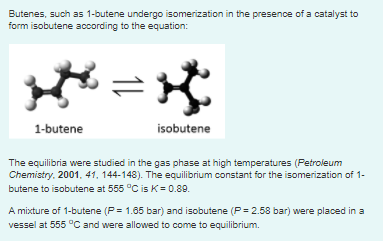Butenes, such as 1-butene undergo isomerization in the presence of a catalyst to form isobutene according to the equation: 1-butene isobutene The equilibria were studied in the gas phase at high temperatures (Petroleum Chemistry. 2001, 41, 144-148). The equilibrium constant for the isomerization of 1- butene to isobutene at 555 °C is K= 0.80. A mixture of 1-butene (P= 1.65 bar) and isobutene (P= 2.58 bar) were placed in a vessel at 555 °C and were allowed to come to equilibrium.
Butenes, such as 1-butene undergo isomerization in the presence of a catalyst to form isobutene according to the equation: 1-butene isobutene The equilibria were studied in the gas phase at high temperatures (Petroleum Chemistry. 2001, 41, 144-148). The equilibrium constant for the isomerization of 1- butene to isobutene at 555 °C is K= 0.80. A mixture of 1-butene (P= 1.65 bar) and isobutene (P= 2.58 bar) were placed in a vessel at 555 °C and were allowed to come to equilibrium.
Chemistry: Principles and Reactions
8th Edition
ISBN:9781305079373
Author:William L. Masterton, Cecile N. Hurley
Publisher:William L. Masterton, Cecile N. Hurley
Chapter22: Organic Chemistry
Section: Chapter Questions
Problem 60QAP: Write an equation for the reaction of chloroacetic acid (Ka=1.5103) with trimethylamine (Kb=5.9105)...
Related questions
Question

Transcribed Image Text:Which of the following statements below is true?
O Q= 0.640, therefore, the reaction will shift to make more 1-butene to reach equilibrium.
O Q= 0.891, therefore the reaction is at equilibrium and will not proceed in either direction.
O Q= 1.58, therefore, the reaction will shift to make more 1-butene to reach equilibrium.
O Q= 0.640, therefore, the reaction will shift to make more isobutene to reach equilibrium.
O Q= 1.56, therefore the reaction will shift to make more isobutene to reach equilibrium.

Transcribed Image Text:Butenes, such as 1-butene undergo isomerization in the presence of a catalyst to
form isobutene according to the equation:
1-butene
isobutene
The equilibria were studied in the gas phase at high temperatures (Petroleum
Chemistry. 2001. 41, 144-148). The equilibrium constant for the isomerization of 1-
butene to isobutene at 555 °C is K= 0.89.
A mixture of 1-butene (P= 1.65 bar) and isobutene (P = 2.58 bar) were placed in a
vessel at 555 °C and were allowed to come to equilibrium.
Expert Solution
This question has been solved!
Explore an expertly crafted, step-by-step solution for a thorough understanding of key concepts.
This is a popular solution!
Trending now
This is a popular solution!
Step by step
Solved in 2 steps

Knowledge Booster
Learn more about
Need a deep-dive on the concept behind this application? Look no further. Learn more about this topic, chemistry and related others by exploring similar questions and additional content below.Recommended textbooks for you

Chemistry: Principles and Reactions
Chemistry
ISBN:
9781305079373
Author:
William L. Masterton, Cecile N. Hurley
Publisher:
Cengage Learning

Organic Chemistry
Chemistry
ISBN:
9781305580350
Author:
William H. Brown, Brent L. Iverson, Eric Anslyn, Christopher S. Foote
Publisher:
Cengage Learning

Chemistry & Chemical Reactivity
Chemistry
ISBN:
9781337399074
Author:
John C. Kotz, Paul M. Treichel, John Townsend, David Treichel
Publisher:
Cengage Learning

Chemistry: Principles and Reactions
Chemistry
ISBN:
9781305079373
Author:
William L. Masterton, Cecile N. Hurley
Publisher:
Cengage Learning

Organic Chemistry
Chemistry
ISBN:
9781305580350
Author:
William H. Brown, Brent L. Iverson, Eric Anslyn, Christopher S. Foote
Publisher:
Cengage Learning

Chemistry & Chemical Reactivity
Chemistry
ISBN:
9781337399074
Author:
John C. Kotz, Paul M. Treichel, John Townsend, David Treichel
Publisher:
Cengage Learning

Chemistry: The Molecular Science
Chemistry
ISBN:
9781285199047
Author:
John W. Moore, Conrad L. Stanitski
Publisher:
Cengage Learning